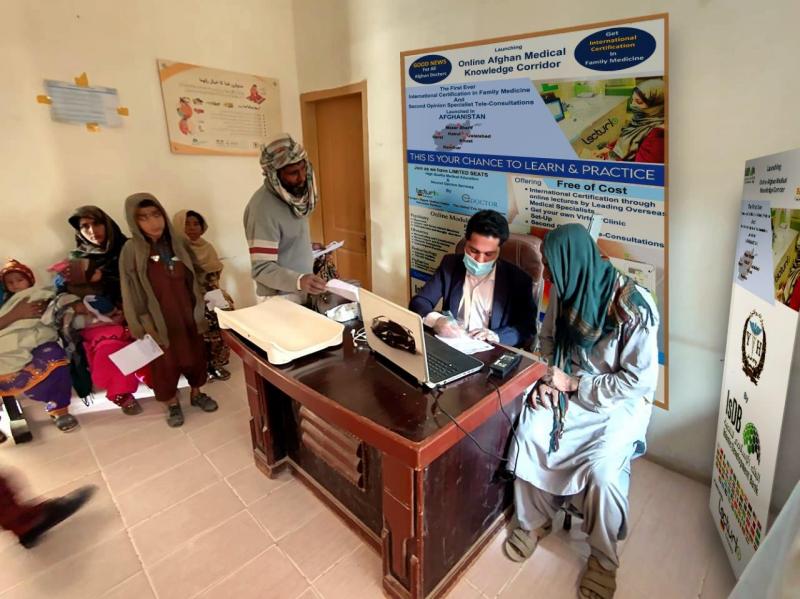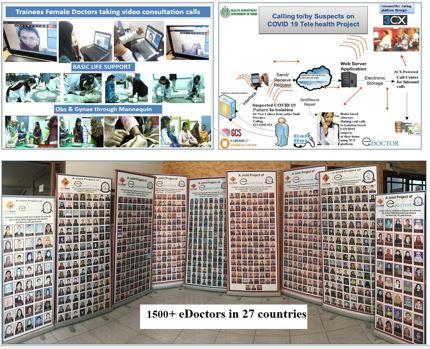Creating a Home-based Lady Doctors Telehealth Network by Educast (pvt)Ltd
The Challenge
Pakistan produces 14,000 physicians every year, with 70% of them being women. Many women are under intense societal pressure to give up their jobs and dedicate their lives to their families. Women prefer to work from home or in locations close to their homes. As a result, just 25% of female doctors are employed. There are around 25,000 such female physicians who abandoned their careers after getting married.
The government of Pakistan spends approximately $35,000 on each female doctor's education and on-the-job training. However, when female doctors leave the profession, there is a disruption in healthcare planning and a scarcity of female healthcare practitioners. On the other hand, there is an urgent need for female doctors to assist in the prevention of the region's highest rate of Maternal and Infant mortality. In Pakistan, one in every 89 women dies each year because of complications during pregnancy and delivery, while the yearly abortion rate is 50 per 1000 women, resulting in 2.2 million abortions each year. These challenges are exacerbated by a lack of access to necessary and high-quality care, particularly for women from low-income and rural areas, as well as a dearth of experienced and qualified female health practitioners.
The Solution
 In 2017, EDUCAST sought to educate the much-needed female doctors who had left the profession owing to social and family commitments. It formed an academic partnership with a major medical university in Sindh Province, Dow University of Health Sciences, and the Dow Graduate Association of North America (DOGANA) and began providing online refresher medical education to thousands of Pakistani female physicians, as well as launching the eDoctor platform. The eDoctor initiative leverages Telehealth medical education and facilities to develop in-country healthcare provider capacities for the provision of remote medical and non-medical services (e.g. patient and professional health-related education, digital health surveillance, and medical records management, training, collaboration among healthcare providers and workers) to areas with scarce health facilities including online specialist advisory services using innovative diagnostic tools and contemporary applications, to areas with few health facilities.
In 2017, EDUCAST sought to educate the much-needed female doctors who had left the profession owing to social and family commitments. It formed an academic partnership with a major medical university in Sindh Province, Dow University of Health Sciences, and the Dow Graduate Association of North America (DOGANA) and began providing online refresher medical education to thousands of Pakistani female physicians, as well as launching the eDoctor platform. The eDoctor initiative leverages Telehealth medical education and facilities to develop in-country healthcare provider capacities for the provision of remote medical and non-medical services (e.g. patient and professional health-related education, digital health surveillance, and medical records management, training, collaboration among healthcare providers and workers) to areas with scarce health facilities including online specialist advisory services using innovative diagnostic tools and contemporary applications, to areas with few health facilities.
Initially launched with the goal of providing opportunities for out-of-practice doctors to re-enter the workforce, EDUCAST created specialized online programs for retraining and then certification of female doctors from around the world. The platform also provides elderly people and those in bed with home care and rehabilitation through digital health for remote home health monitoring via the internet and mobile health services. The platform employs unique Broadband aggregators to overcome local sluggish internet access, with 9 x CDMA internet dongles bonding with all accessible internet connections from various providers and a study bonded stream to the broadband line for consistent video streaming. After four years of effective training, the eDoctor program has over 1,000 female doctors on its platform. During the outbreak of the COVID-19 pandemic, Educast successfully managed over 150,000 Covid-19 positive patients during home  isolation monitoring. Acknowledging the impact of their efforts, Stanford University's Center for Medicine approached EDUCAST to assist in the training of the eDoctors. Top Stanford academics delivered a six-week online training using CDC (Centers for Disease Control, USA) and WHO standards, allowing all 450 eDoctors to be certified as COVID-19 caregivers.
isolation monitoring. Acknowledging the impact of their efforts, Stanford University's Center for Medicine approached EDUCAST to assist in the training of the eDoctors. Top Stanford academics delivered a six-week online training using CDC (Centers for Disease Control, USA) and WHO standards, allowing all 450 eDoctors to be certified as COVID-19 caregivers.
Key Achievements
- 1000 female doctors are now back in the national health network delivering e-services to improve access
- An estimated amount of USD$ 30 million worth of lost investment has now been returned back in form of eDoctors
- Certified eDoctors improving the healthcare sector through eHealth platforms to improve access and quality of services for women of reproductive age
- Established 70 centers of maternal and childcare telehealth network
- Saved thousands of newborns and pregnant women from dying
- Largest female eDoctors network
Technology Transfer Potential
EDUCAST has been approached by Yemen-based organizations for help regarding maternal and child deaths due to the non-availability of timely healthcare advice and virtual training of front-line workers. Through its Islamic Development Bank-funded technology platform, EDUCAST has offered support to establish a multipurpose telehealth center in war-torn areas of Yemen to help needy people with healthcare services as well as train the on-ground front-line female healthcare workers. The Yemen ‘maternal & fetal wellbeing’ initiative is spearheaded by the UK-based MedRet Academy. MedRet Academy presented this project at the request of the United Nations, during the WSIS (World Summit of Information Society) annual virtual conference 2021, at a high-profile session on using technology to tackle today’s health challenges, especially in the developing world.
Educast has continued working with IsDB to replicate its success in Afghanistan as well. In December 2022, IsDB approved a grant operation for the Establishment of Tele-Health Education and Clinical Support Facilities in Afghanistan. The overall objective of the project is to set up telehealth education and clinical support facilities in six regional hospitals in Afghanistan covering (Kabul, Jalalabad, Kandahar, Herat, Mazar and Khost). The Centers will be utilized to develop the medical capacity of up to 1,500 Afghani doctors. Besides Afghanistan, the Digital Health platform and e-Doctors network can be scaled up to expand its counseling and treatment services in Maternal, Child, and Mental Health to other Member Countries of the Bank including fragile states such as Palestine, Yemen, Syria, and Oman.

